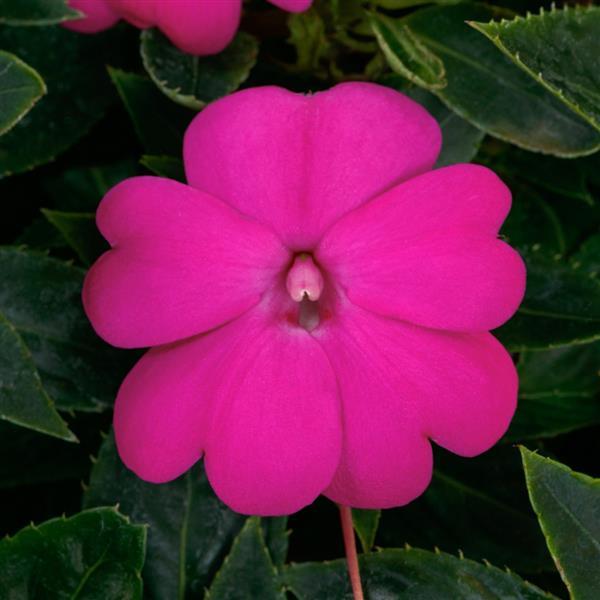Impatiens, Sunpatien Compact Lilac
$8.99
Plant, Zone 9+
Discount per quantity
| Quantity | 3 - 8 | 9 - 14 | 15+ |
|---|---|---|---|
| Price | $8.72 | $8.45 | $8.09 |
| % Discount | 3% | 6% | 10% |
Description
SunPatiens Compact Lilac: Easygoing Color for Sun-Soaked Spaces
An inviting guide for gardeners who crave nonstop lavender blooms without the fuss.
Welcome to the World of SunPatiens
You and I both know the charm of classic impatiens. Their cheery faces brighten shady corners, yet they wilt in full sun and sometimes fall to downy mildew. Enter SunPatiens®, a breakthrough cross that marries tropical New Guinea impatiens with wild species that love heat. The Compact series stays neat, topping out at about two feet, while still delivering armloads of flowers.
Compact Lilac steals the show with soft-purple petals that glow all season. You gain the elegance of lavender tones plus the toughness to handle July’s heat. Let’s explore how this cultivar can make your beds, baskets, and sidewalk planters feel like a curated oasis.
Quick Facts at a Glance
| Trait | Details |
|---|---|
| Plant Type | Annual (perennial only in USDA Zones 10–11) |
| Mature Size | 14–24 in. tall, 14–18 in. wide |
| Bloom Window | Planting day until first frost |
| Light Needs | Full sun to part shade (4–6 hrs sun ideal) |
| Water | Even moisture; tolerates brief dryness |
| Soil | Rich, well-draining, slightly acidic (pH 6.0–6.5) |
| Feeding | Balanced fertilizer every 3–4 weeks |
| Special Perks | Heat & humidity proof, mildew resistant, self-cleaning |
Keep these specs close. They guide every gardening move we make together.
Color and Form: Why We Crave Compact Lilac
- Sophisticated Shade
Lilac blooms lean toward a cool lavender with a gentle white eye. They look refined beside silver foliage or creamy whites. - True Compact Habit
While many annuals stretch, this one behaves. It forms a rounded mound, perfect for edging, massing, or container centerpieces. - Sun-Loving DNA
We’re free from the old rule that impatiens equal shade. Feel confident planting under blazing patio umbrellas or along driveways. - Relentless Flower Power
Buds keep forming at every node. Because the petals self-shed, we never have to deadhead. That’s time back in our pocket for more adventures. - Disease Armor
Unlike traditional impatiens, SunPatiens shrug off downy mildew. You’ll notice strong stems, glossy leaves, and zero white fuzz.
Getting Started: Planting Made Simple
1. Pick the Perfect Spot
- Sun Check: Aim for morning or late-afternoon rays. Midday scorch is fine if soil stays moist.
- Air Flow: Space plants 14–18 in. apart so breezes pass through. Air movement keeps foliage dry and healthy.
- Accessible Water: Containers should sit near a hose or rain-barrel spigot. Thirsty plants teach us that convenience matters.
2. Prepare the Soil or Potting Mix
- In-Ground Beds: Work in 2–3 in. of compost to boost nutrients. Loosen soil at least 8 in. deep for easy rooting.
- Containers: Choose a peat-based mix labeled “professional” or “lightweight.” Add a handful of perlite for extra drainage.
3. Transplant with Care
- Water seedlings in their packs an hour before planting.
- Dig a hole the same depth as the root ball.
- Slide the plant out gently—no tugging on stems.
- Set it so the soil line of the plug matches the garden soil line.
- Backfill, press lightly, and water until the ground feels sponge-soft.
4. Mulch and Label
One inch of fine pine bark or shredded leaves helps lock in moisture and stop weeds. Tuck a weatherproof label nearby to remind neighbors—and future you—of the variety name.
Everyday Care: Easy Routines that Pay Off
Watering Wisdom
- First Week: Check daily. Keep soil evenly moist but never soggy.
- After Establishment: Water when the top inch feels dry. In midsummer heat, that may be every other day in pots.
Tip: Early-morning watering lowers evaporation loss and lets leaves dry before nightfall.
Feeding Fundamentals
- Mix a slow-release granular fertilizer into the soil at planting.
- Every month, drench with a half-strength balanced liquid feed (for example, 10-10-10). This gentle boost fuels constant flowering.
Pruning and Grooming
SunPatiens are self-cleaning, yet we sometimes trim for shape:
- Pinch leggy tips once in midsummer to encourage bushiness.
- Snip any storm-damaged stems right above a leaf node.
That’s it. No shears? Use fingers. The plant forgives.
Troubleshooting: Peace of Mind for Common Hiccups
| Symptom | Likely Cause | Quick Fix |
|---|---|---|
| Leaves wilt by afternoon but perk at dusk | Heat + low water | Deep soak in morning; add mulch |
| Yellow lower leaves | Overwatering or poor drainage | Let soil dry slightly; ensure pot holes aren’t blocked |
| Faded blooms | Nutrient dip | Apply liquid feed; confirm pH isn’t above 7.0 |
| Tiny speckles, fine webbing | Spider mites in hot, dry spells | Hose down foliage; use insecticidal soap weekly until clear |
By catching issues early, we keep plants upbeat and productive.
Design Ideas: Spark Inspiration
Color Combos We Love
- Lavender & Lime: Pair Compact Lilac with chartreuse coleus for zesty contrast.
- Purple Harmony: Mix with heliotrope and verbena to craft a soothing monochrome bed.
- Sunset Surprise: Ring it with orange calibrachoa to make both colors pop.
Container Recipes
| Position | Plant | Purpose |
|---|---|---|
| Thriller (Center) | SunPatiens Compact Lilac (3 plants) | Vertical bloom tower |
| Filler | Silver falls dichondra | Cascading shine |
| Spiller | White bacopa | Soft edge and extra flowers |
Use a 16-inch pot, good potting mix, and you’ll enjoy a lush bouquet until frost.
Landscape Placements
- Front Walk Accent: Line a path so guests meet waves of lilac color.
- Poolside Planters: Bright petals hold their own against reflective water and stone.
- Small-Space Feature: Plant in a single whiskey barrel for a calm, cottage vibe.
Propagation and Overwintering
While most gardeners treat SunPatiens as annuals, we have options:
- Take Cuttings in Late Summer
- Snip 3-in. non-flowering tips.
- Dip in rooting hormone.
- Stick into vermiculite under bright, indirect light.
- Roots appear in 10–14 days.
- Winter Windowsill Oasis
- Pot three rooted cuttings in an 8-in. container.
- Place near a south-facing window.
- Keep temps above 60 °F.
- Lightly feed once a month.
In spring, you already have starter plants ready for outdoor life.
Sustainable Touches You Can Try
- Rain-Barrel Irrigation: SunPatiens love warm collected rainwater. Let’s reduce tap usage together.
- Pollinator Pause: Though impatiens aren’t the top nectar source, their pollen still supports early bees. Mix in native blooms for diversity.
- Compost Mulch: Replace synthetic dyes with living, nutrient-rich compost. Your soil community will thank you.
Community and Sharing
Invite neighbors to cut a few stems for table bouquets. Host a weekend “Impatiens Exchange” where everyone brings a different color. Garden joy multiplies when shared.
Lilac-Hued Horizons Await
Our journey with SunPatiens Compact Lilac proves that gardening can be both simple and stunning. By choosing a plant bred for resilience, we spend less time troubleshooting and more time enjoying its calm lavender glow. Grab your trowel, pick the sunniest corner, and let those gentle petals remind us that easy care and vibrant color can live in perfect harmony.
Let the Lavender Adventure Begin
Additional information
| Weight | N/A |
|---|---|
| Options | Starter Plug – 3 count, 4 in. (16.9 fl. oz.) Pot |





